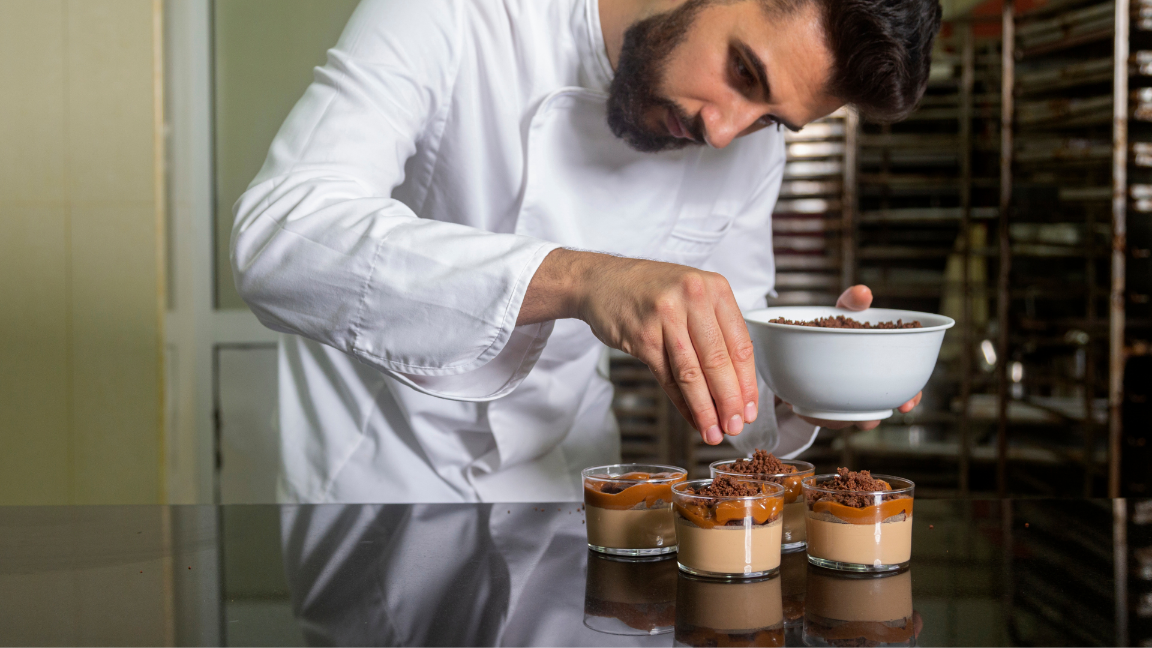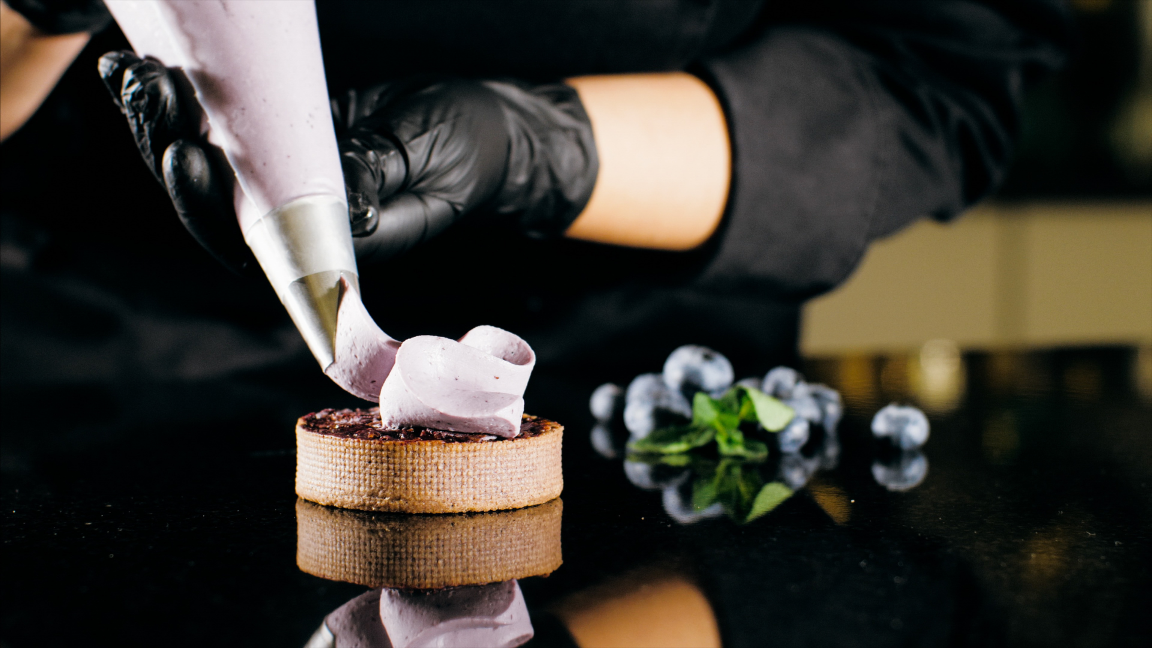Becoming a Pastry Chef in the UK
Are you passionate about creating exquisite desserts and baked goods? A career as a pastry chef might be perfect for you. This guide will walk you through everything you need to know about becoming a pastry chef in the UK, from qualifications to career progression.
Understanding the Role of a Pastry Chef
A pastry chef is a culinary professional who specialises in creating desserts, pastries, breads, and other baked goods. Unlike bakers who typically focus on bread and simple baked items, pastry chefs create more complex desserts and confections, often requiring advanced techniques and artistic skill.
Duties might include:
Menu Development: Designing and preparing a wide range of desserts, pastries, and baked goods.
Ingredient Management: Selecting high-quality ingredients and managing specialised inventory like flour, chocolate, and yeast.
Station Leadership: Managing the pastry station and ensuring all output meets the head chef's standards.
Technical Execution: Utilising precise techniques for tempering chocolate, sugar work, and dough preparation.
Kitchen Safety: Maintaining strict hygiene and food safety standards within the pastry department.
Different Types of Pastry Chefs
The pastry chef profession encompasses several distinct specialisations, each requiring unique skills and expertise. Dessert specialists excel in creating plated desserts for restaurants, crafting beautiful presentations that complement fine dining experiences. Bread specialists focus on perfecting artisanal breads and viennoiserie, mastering the science of fermentation and dough development. Chocolate and sugar artists dedicate themselves to creating stunning decorative pieces and confections, while wedding cake specialists combine technical skill with artistic vision to design memorable celebration cakes.

Qualifications and Training
Educational Requirements
The path to becoming a pastry chef can take several forms, and while formal education isn't always mandatory, most successful professionals complete some form of structured training.
Professional diplomas in patisserie offer comprehensive foundations in both theory and practice. NVQ Level 2 and 3 qualifications in Professional Cookery with a focus on patisserie provide practical, industry-recognised credentials. Foundation degrees in culinary arts offer broader knowledge of the food industry, while advanced apprenticeships provide hands-on experience working alongside established pastry chefs.
Professional Certification
Professional certification can significantly advance your career prospects in the pastry arts. The UK offers several prestigious certifications through respected organisations such as The Craft Guild of Chefs, The Royal Academy of Culinary Arts, and City & Guilds. These credentials demonstrate your commitment to the profession and validate your expertise to potential employers.
Career Progression and Hierarchy
The progression from entry-level to executive pastry chef follows a well-established path in professional kitchens. Beginning as a Commis Pastry Chef, you'll learn the fundamentals while assisting more experienced staff. As you advance to Demi Chef de Partie and then Chef de Partie, you'll take on more responsibility for specific sections of the pastry kitchen. The role of Sous Pastry Chef involves both hands-on work and supervisory duties, preparing you for the position of Head Pastry Chef. At the executive level, you'll manage entire pastry operations, develop menus, and train staff.

Essential Skills
Success as a pastry chef requires a combination of technical expertise and personal qualities. Precise measurement and timing skills form the foundation of consistent baking, while thorough knowledge of food safety and hygiene ensures professional standards. Creative flair for presentation sets exceptional pastry chefs apart, allowing them to create visually stunning desserts that delight customers.
Physical stamina plays a crucial role, as the work involves long hours standing and repeated physical tasks. Strong organisational abilities and time management expertise help pastry chefs handle multiple projects while maintaining quality. Leadership capabilities become increasingly important as you progress in your career, particularly when managing teams and training new staff. Mathematical skills are essential for scaling recipes and managing costs effectively.
Working Environment
Daily Responsibilities
The working life of a pastry chef requires dedication and careful planning. Early morning starts are common, as fresh pastries and breads must be ready for breakfast service. The day typically begins with reviewing orders and preparing mise en place for the day's production. As the day progresses, pastry chefs balance immediate tasks like filling orders with longer-term projects such as developing new recipes and planning seasonal menus.
Quality control remains a constant focus, ensuring each item meets exact standards before leaving the kitchen. Special orders, particularly for events or celebrations, require additional attention and often involve client consultations. Team supervision and training form an important part of senior roles, as does managing inventory and maintaining relationships with suppliers.

Work Settings
Pastry chefs work in various environments, each offering unique opportunities and challenges:
High-end restaurants
Hotels and resorts
Patisseries and bakeries
Catering companies
Private clubs
Production bakeries
Cruise ships
Salary and Benefits
The financial rewards of a pastry chef career vary significantly based on experience, location, and workplace setting. Junior pastry chefs typically start at around £22,000 with mid-level professionals earning between £25,000 - £35,000. Senior pastry chefs can expect salaries of £35,000 - £45,000, while executive positions, particularly in London and other major cities, can command £45,000 or more.
Getting Started in Your Career
Beginning your career as a pastry chef requires careful planning and dedication. First, focus on building strong foundational skills through education or apprenticeship programmes. Practical experience in entry-level positions provides essential hands-on learning and helps you understand the realities of professional kitchen work. As you progress, developing a specialisation can help you stand out in the job market.
Networking within the industry opens doors to opportunities and mentorship. Consider additional certifications to demonstrate your expertise and commitment to professional growth. Building a portfolio of your work, including photographs and descriptions of your creations, helps showcase your abilities to potential employers. Reaching out to recruitment agencies like Select Recruitment can also give you an advantage, as they will have contacts in the industry and know of job openings that could suit you.
Professional Development
Professional growth in pastry arts requires continuous learning and adaptation. Staying current with industry trends helps you meet changing customer preferences and market demands. Regular participation in workshops and masterclasses exposes you to new techniques and perspectives. Professional associations provide valuable networking opportunities and access to industry resources.
The Future of Pastry Arts
The pastry chef profession continues to evolve with changing consumer preferences and technological advances. Increased demand for speciality desserts reflects growing interest in unique dining experiences, while social media offers a fantastic platform for talented pastry chefs to show off their creations.
Dietary requirements, such as vegan and gluten-free options, create new challenges and opportunities for innovation. Modern techniques and equipment expand the possibilities for creative expression, while growing appreciation for artisanal products supports traditional craftsmanship.
Select Recruitment
Finding your perfect role in the pastry arts industry requires careful planning and dedication. If you're looking to start or advance your career as a pastry chef, our recruitment specialists at Select Recruitment can help match you with opportunities that align with your skills and career goals. Contact our team to discuss how we can support your journey in the culinary arts.


